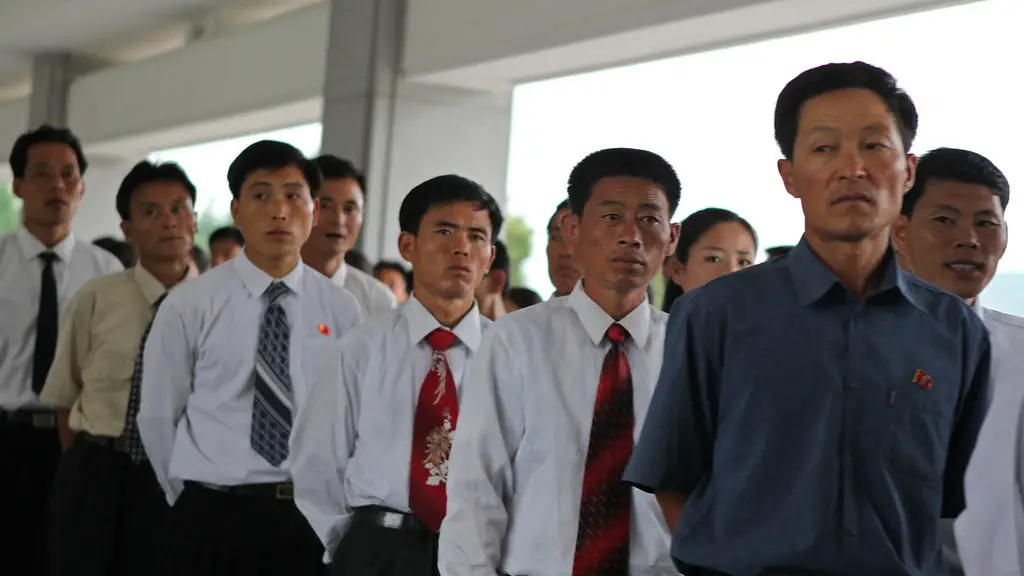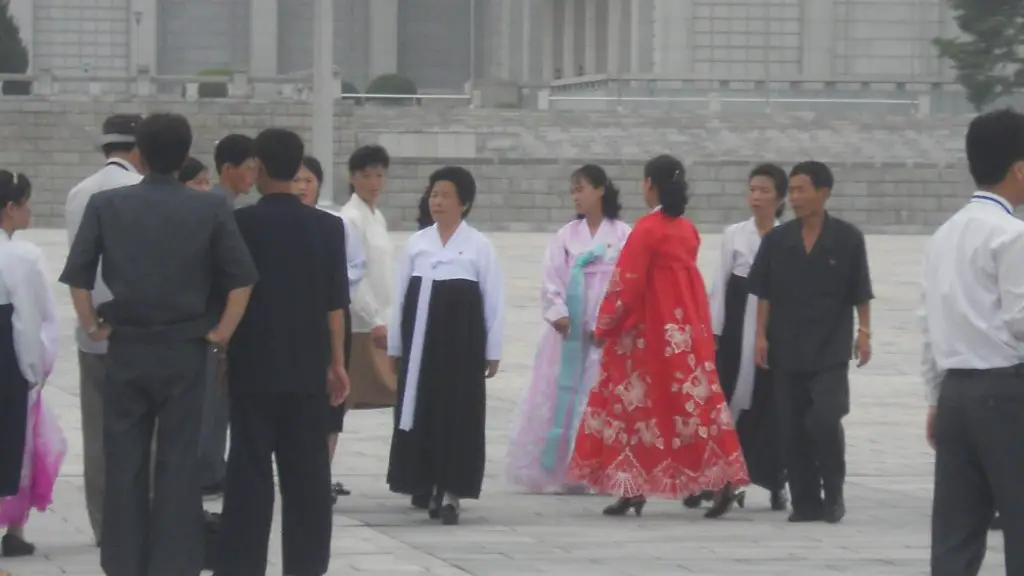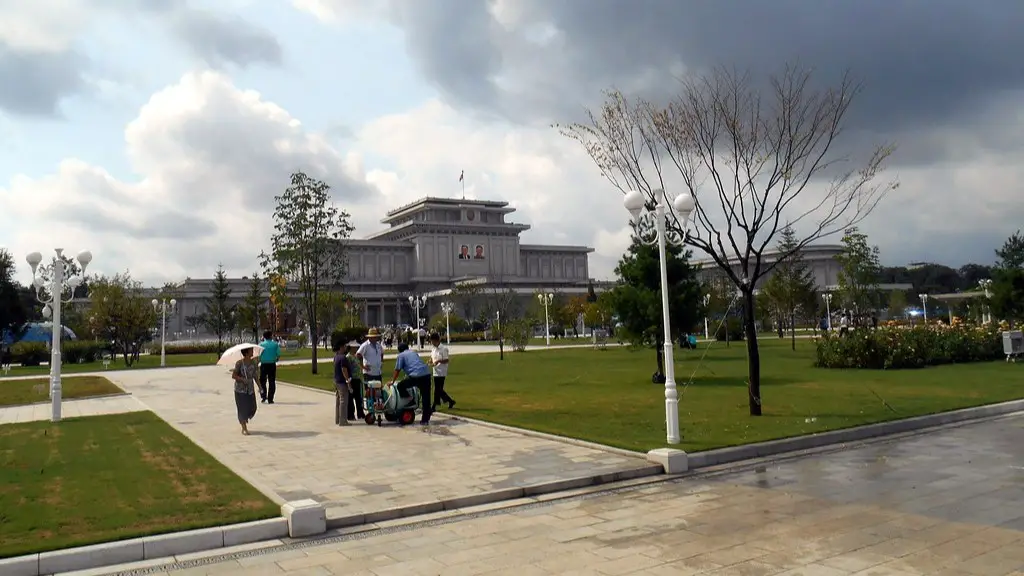North Korea has been a source of international tension for decades, and its relationship with the United States has been strained. North Korea has made its displeasure of American foreign policy perfectly clear and has frequently threatened the security of its citizens with nuclear weapons. So, what exactly does North Korea have against the United States?
The main reason why North Korea despises the US can be traced back to the Korean War in the 1950s. The US fought alongside South Korea against the North Korean-Chinese partnership in the war. The North Korean government has carried a strong resentment of the US since then. North Korean leaders also perceive American intervention in world affairs as a threat to their own power, worldview and control over their population.
Aside from a historical context, North Korea’s intense hatred towards the US can be traced to the moral system their government implements. From an economic standpoint, North Korea is a closed system. They rarely have any interaction with the outside world and are not able to benefit from things like the free trade agreements established between the US and other countries in the region. North Korean leaders do not trust outsiders and feel threatened by US influence in the region.
One of the most significant issues North Korea has with the US is the presence of US troops in South Korea. North Korea has viewed this as an invasion of their territory and a threat to their security. The reclusive nation has repeatedly called for the withdrawal of US troops from the peninsula. This sentiment has been echoed by leaders in and out of North Korea who feel that US presence on the Korean peninsula is an unnecessary provocation that must be rectified.
Taking into account the human rights issues in North Korea, the US has been an outspoken critic of their regime. In response, North Korean leaders have attempted to deny and downplay the severity of their human rights abuses. They have also launched personal attacks on US leaders and public officials in an attempt to discredit them and draw attention away from their own actions. This heated rhetoric has only served to escalate tensions between the two nations.
Finally, North Korea is also concerned by what they see as a US-led effort to contain them. US foreign policy in the region has been geared towards isolating North Korea and limiting its access to resources, while South Korea and other US allies in the region continue to grow in power and influence. This is seen by North Korean leaders as a threat that must be responded to in some way.
Continued US Sanctions Against North Korea
The US has issued a number of economic sanctions against North Korea in an effort to put pressure on the regime and its nuclear ambitions. These sanctions have targeted North Korean businesses, resources and individuals, limiting their access to the international economy. This form of economic punishment has been seen by many as a way for the US to try to recreate the “maximum pressure” campaign that resulted in the denuclearization of Iran.
However, the economic pressure placed on North Korea has not had the intended effects. The regime has been able to acquire the resources it needs despite the international sanctions, and has even found ways to take advantage of these restrictions. North Korean leaders often cite US sanctions as a primary reason why they continue to pursue nuclear weapons and ramp up their rhetoric against the US.
Overall, the US sanctions against North Korea play a key role in their animosity towards the United States. While the US has defended their use of economic pressure, North Korea views the sanctions as a form of economic warfare that is designed to starve their citizens and weaken their sense of national pride.
Moreover, the sanctions have increased the financial isolation of North Korea and its citizens. This has only served to further fuel North Korea’s paranoia and resentment of US foreign policy, making it even more difficult to find a diplomatic solution to the tensions between the two countries.
China’s Position In The Confrontation
Despite being traditionally close with North Korea, China has in recent years often supported US policy towards their neighbor due to their growing economic ties with the US. This has created a complicated situation in which the North Korean government has been forced to prioritize its relationship with China in order to maintain access to its resources and markets.
At the same time, Chinese leaders have realized that their relationship with the US has a greater impact on their own economy and political standing in the world. This has resulted in China often siding with the United States on matters related to North Korean nuclear ambitions and international sanctions. This has been seen by North Korean leaders as a betrayal and only increased their paranoia of US activity in the region.
North Korean leaders have responded to this by further isolating themselves from their traditional ally, citing China’s support of the US and their own economic interests. This has only escalated the tensions between the two countries and further exacerbated the animosity North Korea has towards the US.
North Korea’s Growing Military Presence
The North Korean government has also been taking steps to bolster its own military capabilities in response to US foreign policy. This has ranged from engaging in provocative military exercises, to increasing the size and capability of their armed forces. These efforts have been seen by US leaders as a direct challenge to their own military superiority in the region.
In addition, North Korea has also invested heavily in their own nuclear weapon capabilities and has recently developed the technology to create long-range ballistic missiles that could reach the US mainland. This has been seen as a direct threat by US leaders and has heightened the tension between the two countries.
Moreover, North Korea has also increased its cyber warfare capabilities in recent years and is seen by many as a major threat to US security. US intelligence agencies have identified North Korea as one of the primary state-sponsored cyber threat actors in the world, and there have been multiple high-profile attacks attributed to them.
Overall, North Korea’s growing military capabilities and willingness to use them has greatly increased the tension between the two countries and has made them even more hostile towards one another.
The Growing Risk Of War
The current situation between the United States and North Korea has become increasingly precarious in recent years, and there is a growing risk of war between the two countries. Although both sides have shown some willingness to engage in diplomacy, the mistrust and hostility between the two have soured any chance of a diplomatic solution.
The US has maintained its position that all options are on the table when it comes to dealing with North Korea, while North Korea has refused to budge on its own demands such as the removal of US troops from the Korean peninsula and the lifting of economic sanctions. This has only increased the likelihood of military conflict between the two nations.
Furthermore, US officials have recently expressed concerns about North Korea’s growing nuclear capabilities, and the potential threat they pose to US security. This has sparked further debate over the best course of action to take and only increases the risk of war between the two countries.
In the end, North Korea’s hostility towards the US is a result of decades of political tensions and mistrust. Unless both sides are willing to compromise on their demands, the likelihood of war between the two countries will only increase.
The Impact Of US Politics On North Korean Relations
US political leaders have long been divided on how to approach the situation with North Korea, and the current administration’s approach has been particularly aggressive. The Trump administration has consistently pressured China to increase economic pressures against North Korea, and has made it clear that all options are on the table when it comes to dealing with the regime.
In addition, US officials have also made it clear that it is willing to take military action if necessary, which has only served to increase the tensions between the two countries. The Trump administration’s aggressive stance on North Korea has been seen as counterproductive by many experts, who argue that a more diplomatic approach is necessary in order to find a lasting solution to the conflict.
Moreover, the Trump administration’s posture towards North Korea has had an impact on US allies in the region. US allies such as Japan and South Korea have felt the pressure of the US-North Korean standoff and have been forced to take a more cautious approach to regional affairs that could be seen as provocation by North Korea.
Overall, the US government’s political stance towards North Korea has added another layer of complexity to an already volatile situation. While the Trump administration’s approach to North Korea has allowed them to gain an upper hand in negotiations, it has also sparked concerns that the confrontation could lead to open military conflict.
The Role Of International Organizations In Resolving The Dispute
International organizations have become increasingly involved in the US-North Korea standoff in recent years. Organizations such as the United Nations Security Council (UNSC) and the International Atomic Energy Agency (IAEA) are working towards a diplomatic solution to the conflict. These organizations are pushing both sides to negotiate and compromise in order to find a lasting solution.
In addition, other countries such as China and Russia have also taken an active role in mediating the dispute. China in particular is an important player as it has traditionally had close ties with North Korea and shares a border with the country. China has been pushing North Korea to negotiate and compromise on its nuclear ambitions, while also attempting to allay US concerns about the regime’s intentions.
Moreover, South Korea has also become increasingly involved in the dispute and has taken a more proactive role in recent months. South Korean leaders are pushing for diplomatic solutions and have recently established a hotline with North Korea in an effort to reduce tensions. They have also reached out to the US in an attempt to ease the tensions and find a diplomatic solution.
Overall, international organizations and other countries have been playing a key role in attempting to resolve the dispute between the US and North Korea. While progress has been slow, these efforts are necessary in order to reduce tensions and find a lasting solution to the conflict.





